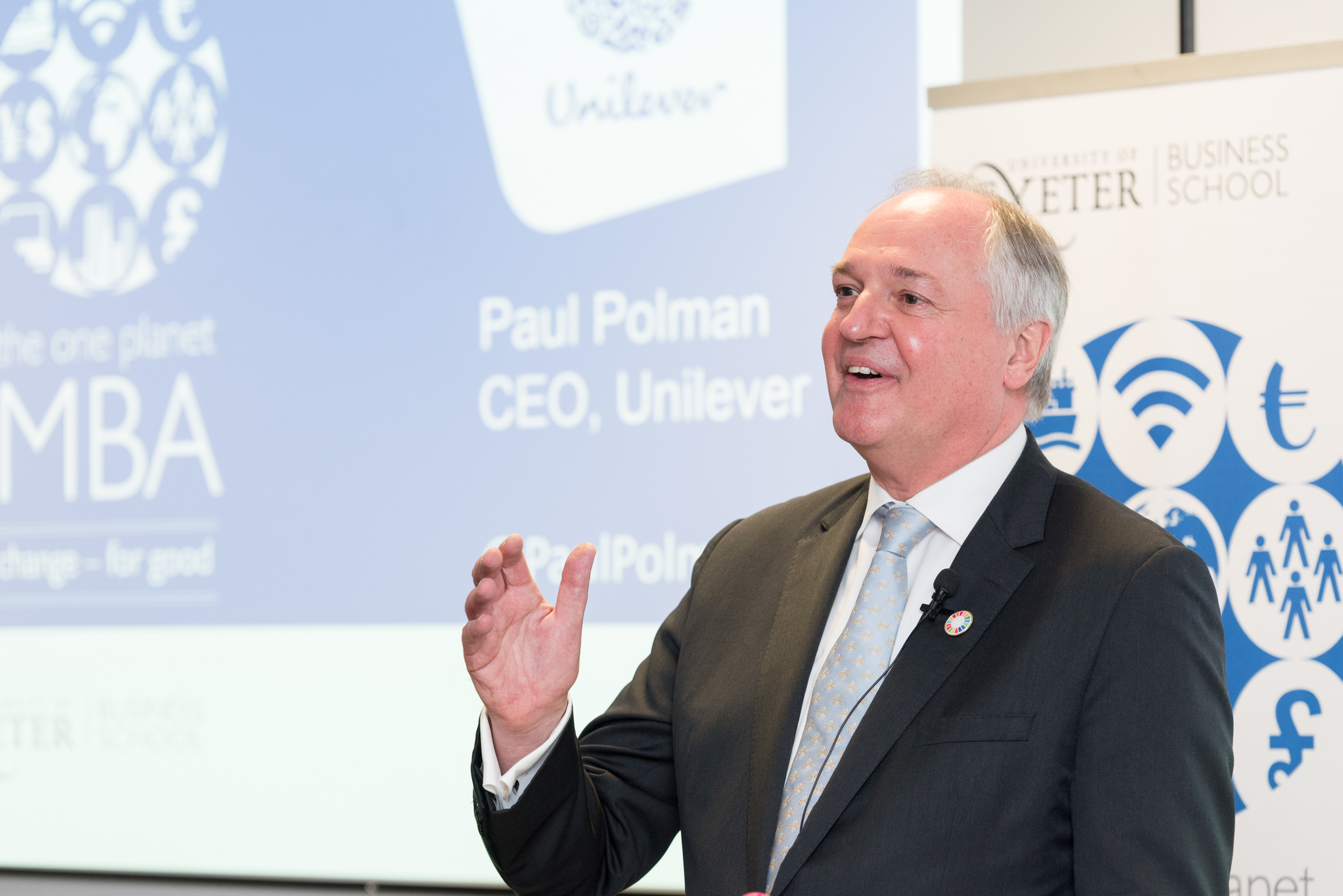Coinciding with the 5th Anniversary of the One Planet MBA, Paul Polman CEO of Unilever shared with Exeter graduates, faculty, business leaders and current students his thoughts on how a leading consumer goods organisation can thrive in a global world.
Reflections: Tom Sisk, One Planet MBA Cohort member
The recently deceased English writer John Berger wrote “The poverty of our century is unlike that of any other. It is not, as poverty was before, the result of natural scarcity, but of a set of priorities imposed upon the rest of the world by the rich.”
We live in a world where financial wealth comes at a cost to us all (including the rich) when contrarian vested interests between shareholders and stakeholders are having destructive effects on the state of our planet. If our planet destructs, businesses too will become extinct and recent OPMBA guest and keynote speaker, Paul Polman CEO of Unilever understands this very well. Corrective behavior has to be a collaboration between corporations and the consumers they serve and the long term survival of businesses is only possible when the interests of both shareholders and stakeholders align.
Paul Polman strongly believes that growing sales and profits, and decreasing negative externalities, are not mutually exclusive and thus he implemented the Unilever Sustainable Living Plan (USLP) in 2010 with the goal to reduce Unilever’s environmental footprint and increase the company’s positive social impact without decoupling these policies from profit growth.
Paul Polman is a man on a mission, a trailblazer with vision who is determined through his role as one of the 17 eminent persons appointed as an advocate of Sustainable Development Goals (SDGs) to redefine the responsibilities of corporations and their leaders. With a mandate to support the Secretary-General in his efforts to generate momentum and commitment to achieve the SDGs by 2030, the SDG Advocates have been working to promote the universal sustainable development agenda, to raise awareness of the integrated nature of the SDGs, and to foster the engagement of new stakeholders in the implementation of these Goals.
Unilever has seen the potential threats of the environment it operates in and has made the choice to pre-empt the risks they face by increasing their ethical standards and in the process finding more efficient and resource friendly ways of conducting their business. As a publicly listed multinational, Unilever also has responsibilities towards its shareholders and Paul Polman has not lost sight of this. Ultimately, Polman and his leadership team have to answer to their shareholders and they, de facto, will decide if he is at liberty to further pursue his views.
The shareholders have to fully support that mission and the price of the shares has to reflect this support. But it doesn’t really end there as the company still has to be financially profitable and therefor is dependent its customers. It is the customers who ultimately represent the vast majority of the stakeholders and this majority will bear the ultimate cost of companies that conduct their business in an unsustainable manner.
Some are critical about Unilever’s motives, linking back to that shareholder accountability but I do believe we owe Paul Polman the benefit of doubt. After hearing him talk, witnessing his passion and drive to steadfastly implement his vision, I feel confident that he is the real deal.
In a talk lasting an hour, Polman also stressed that Unilever will not shy away from using its bargaining power to motivate its trading partners to also adopt best practice. Only the future will tell if Unilever will have truly pioneered a shift in how companies do business and if sustainable practices can drive profits. Unilever most certainly is opening its eyes to reality and Paul Polman is putting personal and corporate short term interests aside as he focuses on the long game.

